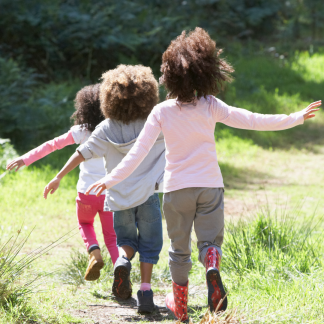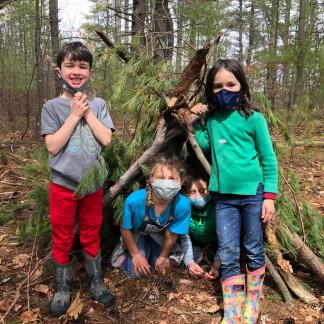Member Spotlight
Common Ground NatureYear
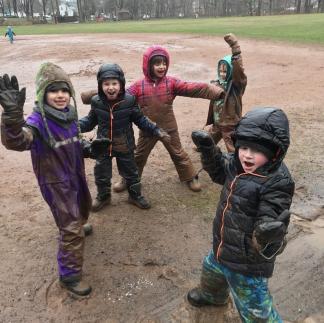
Common Ground is a community environmental education center, an urban demonstration farm, and a high school with a focus on the environment, based in New Haven, CT. Among the programs offered at Common Ground is the NatureYear program, a multidisciplinary enrichment program for children ages 5-14+. Children attend one full day each week for the whole school year, exploring farm and forest through a mix of teacher-led learning and plenty of time for child-led play and choice among activities.
About 30% of NatureYear students are homeschoolers and the rest are enrolled in local public schools, missing a day a week of traditional classroom learning to learn and play in nature instead! The program welcomes about 200 children each year, with classes meeting every weekday and on Saturdays. Classes are fully outside in all weather and utilize a farmhouse classroom for indoor breaks as needed on the coldest or wettest days.
We chatted with Common Ground’s Director of Community Programs, Rebecca Holcombe, to learn more about NatureYear.
New Haven is a diverse community, and your website acknowledges Common Ground’s desire to reflect that diversity in student enrollment. How do you prioritize BIPOC children and families in your NatureYear application and enrollment process?
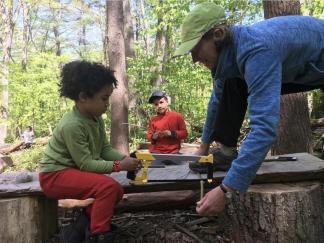
Application and enrollment is only part of the picture. Families first need to know about the program and believe that their child will be safe and welcome. We offer a wide range of programs in order to support nature connection for the New Haven community–free Saturday Open Farm Day, field trips to our campus from local schools, free weekend Nature Playdates for families, nature-based after school programs, and summer camps are among the ways that a family may first get to know Common Ground and develop interest in deeper program connections. Ongoing staff professional development, examination of policies, practices, and staff manual documents, as well as a culture of honest dialogue and learning among staff supports our efforts to continually think about the ways that inclusion shows up (or doesn’t) in our programs for the many identities that our staff, students, and families hold.
Most of the groups in NatureYear are mixed age, with some groups including children ages 5-13. That’s quite a range! Can you share why you structured the program this way? What opportunities and benefits do you see?
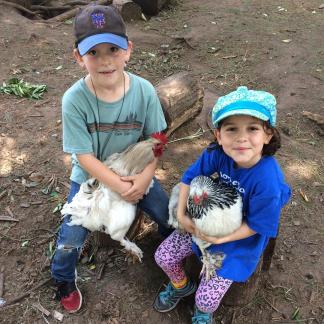
It is often easy to imagine and observe the ways that younger children benefit from the role modeling and helpfulness of older kids but there are many ways that the older kids are benefitting, too! Of course, some of the older children enjoy and benefit from the opportunity to lead and help, but not all “big kids” are seeking that role or responsibility. We often see that having younger children in the group allows the big kids to embrace the imagination and play of childhood that they have not fully let go of yet, but perhaps can’t really embrace at school or in other same-aged peer settings. We love seeing middle schoolers “cooking” in the mud kitchen, making charcoal face paint, or inventing a silly imaginative game with mixed-age friends. For kids ages 11+, NatureYear can be a safe space to still just be a kid, without the pressures and expectations they may feel in same-aged peer groups.
We know that some children do benefit from a more narrow age grouping. In addition to mixed age groups, we also offer early childhood groups for ages 5-7 that focus more on play, stories, music, and moving at a young child’s pace, as well as at least one group for ages 11-14+, intended to honor that some of our students are seeking a special experience just for big kids where they can have conversations and activities that are harder to include the littles in, but in a setting that creates a safe place to navigate the tough middle school years. We are lucky to get to know many of our students over many years, so, in partnership with families, we often have a sense of which children will benefit from a mixed age group and which will be happiest with a more narrow age range of peers.
Common Ground programs emphasize opportunities for students to practice leadership. What does this look like for younger children enrolled in the NatureYear program?
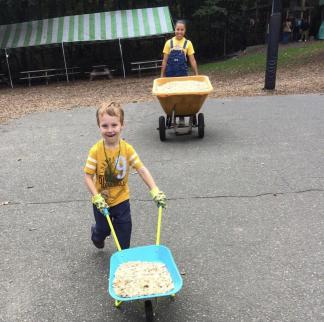
One place this shows up is in the practice of afternoon “kid-led” time. Our mornings are for teacher-led activities, typically with two teachers each offering a lesson that children can choose between for their morning activity. After lunch, it is the kids’ turn to lead! We start with a kid-led meeting circle, where children are invited to share ideas for any activities they would like to lead for their friends, or a place/way they would like to play. For example, “I want to teach my friends how to finger knit” or “I want to play pretend puppies in the shelters.” Children practice communication, compromise, and leadership skills as they negotiate what activities they want to do. We typically have three staff available, so while all ideas are welcome, the group needs to work together to figure out where the kid-led activities will take place and what staff will supervise. It is remarkable to watch kids as young as 5 and 6 start to understand how this works as they participate in groups that include returning NatureYear students who model these leadership skills.


